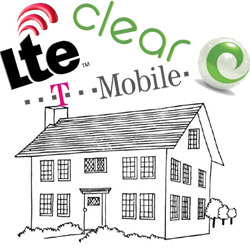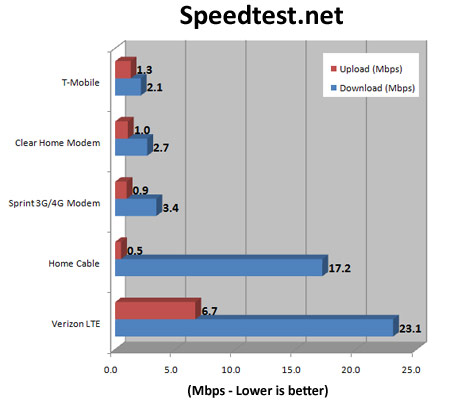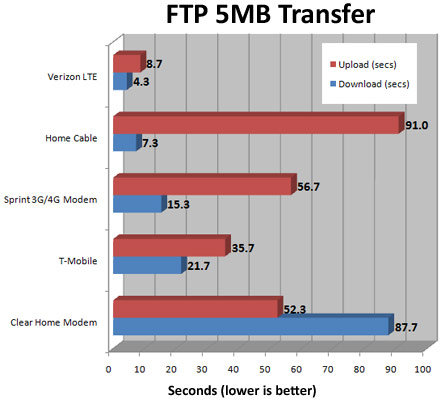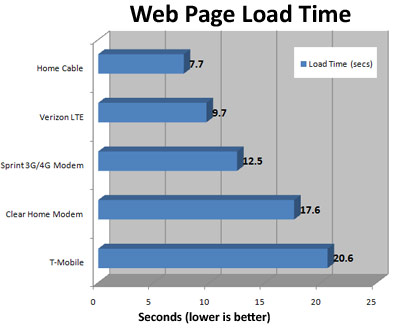Is 4G Good Enough to Replace Your Home Internet?
How does 4G compare with traditional home internet service? We ran some speed tests in a New York City apartment to see what's fastest.

We talk all the time about how we live in a wireless world, but when it comes to your most important connection, your home or business Internet, we're still depending on a complex series of cables that lead to our homes and offices. Here in New York City, for example, one building might have the latest and fastest Internet service while right next door the residents are stuck with something far slower. And when you move between buildings, you need to schedule an appointment and pay for installation of your Internet service.
What if all you needed to do was pick up a wireless modem and plug it in to the wall? Clear, the company behind Sprint's 4G WiMax network, actually offers a $44.99 unlimited 4G home Internet plan today with a special home modem that doubles as an 802.11n router. And even though neither company offers a 4G plan designed for home users, the speed of T-Mobile's 4G HSPA+ network and Verizon's brand new 4G LTE network could make them home or small business options now or in the future. In fact, Verizon CEO Ivan Seidenberg told investors that his company's new service could eventually replace home Internet offerings.
We decided to see just how well each of the three major 4G services: Clear/Sprint WiMax, T-Mobile HSPA+, and Verizon LTE would work as a home service so we tried all three in an East Side Manhattan apartment and compared them to our Time Warner Cable home service. For the Clear/Sprint service we used both Clear's Home modem and the Sprint Sierra Wireless dongle. For T-Mobile, we used the webConnect Rocket stick and, for Verizon, we tested the LG VL600 USB stick. The results we got only apply to one apartment, not the whole city or multiple markets, but they are instructive.
Speedtest.net
To get a baseline, we logged on to Speedtest.net, a site with a great synthetic benchmark that measures download and upload speeds. We repeated each test three times and took the average.

Unfortunately, the Clear Home Modem didn't do any better than the portable Sprint 3G/4G modem. So, if you plan to use Clear for your home service and you have only one PC, you may be better off plugging in a dongle directly. In either case, the Clear/Sprint WiMax service was consistent with what we've seen elsewhere, which is better than 3G, but nowhere near the speed of a home cable connection. What really stood out on this test were the blazing results offered by Verizon. Could those results hold up in our real-world tests?
FTP Upload / Download
We also tried uploading a 5.6MB file and downloading a 5.1MB file from our servers using FTP. We timed each operation and took the average of three. Obviously, lower numbers are better.

What amazed us most here was that, not only did Verizon's 4G LTE download the file nearly twice as fast as our home internet connection, but it also uploaded at over 10 times the speed! In fact, all of the 4G connections were significantly faster at uploads than cable. As for Clear's home modem, it fell short once again on downloads.
Get instant access to breaking news, the hottest reviews, great deals and helpful tips.
Web Page Loads
The activity we all do most on the Internet is load web pages of some kind. We visited three sites (nytimes.com, cnn.com, and laptopmag.com) three times each and took the average download time. Lower is better.

This is the only test where cable, ever so slightly, bested LTE. The WiMax dongle wasn't too shabby either, though it wasn't fast enough to make us want to drop cable.
Conclusions
If you live in an area that doesn't have a good wired Internet connection or you tend to move around a lot, the unlimited Clear plan is a good bargain that provides you with solid, usable connectivity and, with their Take Two: Home + On the Go plan, you can even have both a home and a mobile device at the same time. However, in our experience here in New York, the speeds are nowhere near those provided by cable Internet or 4G LTE. As for LTE, it might as well be called 5G, because it is that much faster than anything else. To be fair, very few people are using Verizon's network right now, and speeds will come down over time. However, if 4G LTE speeds stay within the carrier's advertised range--5 to 12 Mbps down, 2 to 5 Mbps up--it will likely remain the best choice for a long time to come.
If we could afford to spend a ton on Internet access, we'd dump cable, buy a Verizon LTE modem, get the $80 per month 10GB plan, and just stomach the $10/GB overage fees. However, since that's unrealistic for most people, we can hope that Verizon will eventually offer a home plan with either unlimited Internet or a very high data cap in the tens of gigabytes. In an age where it takes a good 40 minutes to upload 5-minute hi-def video to YouTube over cable, LTE's upload speeds alone would make it a winner.
Follow Avram Piltch @Geekinchief and on Google+. Follow us @TomsGuide, on Facebook and on Google+.
-
jingoye I use AT&T's Uverse and it's notoriously shoddy. Thought about cutting the cord, but 1-2 bars of T-Mobile 4G LTE isn't quite enough for my streaming pleasures. Full bars, however...Reply
